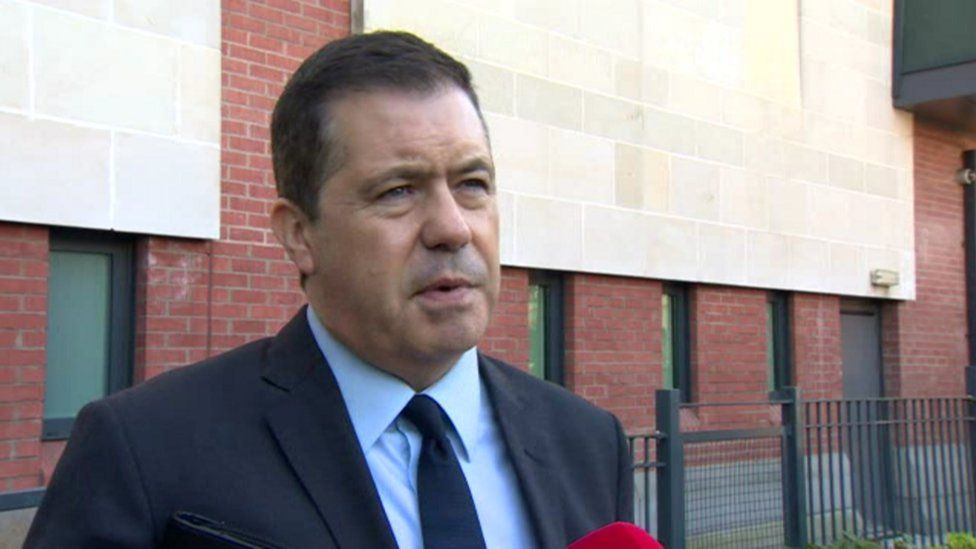Northern Ireland’s justice minister has raised concerns about a proposal for her department to “take the lead” in managing compliance around face coverings to help combat Covid-19, BBC News NI understands.
A health paper suggests Naomi Long should oversee plans to raise compliance levels above 80%.
She said the proposal was “entirely inappropriate”.
Ministers are meeting on Monday to discuss the document.
Last week, the Department of Health warned that unless cases decrease significantly in the next three weeks, then more “severe” restrictions could be required before Christmas.
Health officials have said they are worried about a drop in compliance levels around the wearing of mandatory face coverings.
Since summer 2020, customers have been required to wear them in shops, on public transport and in a number of indoor settings – unless they are exempt.
Health Minister Robin Swann circulated a document to executive ministers last week with a range of proposals aimed at reducing transmission of the virus.
In it, he suggested that Mrs Long should “take the lead in pursuing a minimum of 80% adherence to face coverings requirements, to gather evidence of this for the executive and to report of the number of fixed penalty notices issued”.
In response, the justice minister has said she is “at a loss to understand” why Mr Swann suggested she take on responsibility for the matter.
In a letter to Mr Swann, seen by BBC News NI, she said a number of agencies were involved in overseeing compliance to Covid-19 restrictions including councils and the Police Service of Northern Ireland (PSNI).
“The PSNI will also, rightly, only enforce where necessary,” she added.
Mrs Long warned that the executive had to be aware of the “wider impact” of expecting the PSNI to adjust its approach to enforcement.
“We have seen public confidence in policing being adversely affected whenever the public believe the PSNI are taking a disproportionate approach.”
She said the police and other enforcement agencies were there to be called on as a “final measure”, as the duty remained with businesses to encourage compliance.
She said: “The idea that compliance can be solely or even primarily an issue for justice is fundamentally flawed, as recognised by previous decisions of the executive.”
Mrs Long said she also believed a “key problem” in improving compliance was the lack of consistent messaging across the executive.
She suggested that ministers needed to agree several “key messages” on public health advice at Monday’s executive meeting and promote them “relentlessly”.
Meanwhile, Glyn Roberts, chief executive of Retail NI, said businesses do not have the power to make people wear face coverings.
He told BBC’s Radio Ulster’s Nolan show: “It is not our responsibility to police [it].
“Retailers and their staff do not have the power of sanction, they do not have the power to legally enforce what they have been doing and they have spent millions and millions on making sure their shops are safe, their staff are trained, their staff are safe, encouraging and reminding customers of their responsibility.
“If there is going to be enforcement, it is a matter for the police.”

On Thursday, Mr Swann advised anyone who worked from home when the pandemic began last year should do so again now.
His document also suggested introducing a “scores on the doors” Covid compliance rating for businesses.
Decisions on whether to strengthen current mitigations must be agreed by the executive first.
Health officials believe the proposals could help reduce transmission of the virus.
Stormont ministers have said they do not want to have to impose tougher mitigations that could damage trade.
They have already agreed to put in place proof of Covid status for certain sectors, which will become enforceable from 13 December.



No comments:
Post a Comment
Note: only a member of this blog may post a comment.